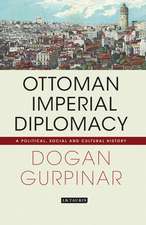Anthropology, Colonial Policy and the Decline of French Empire in Africa
Autor Douglas W. Leonarden Limba Engleză Hardback – 25 dec 2019
| Toate formatele și edițiile | Preț | Express |
|---|---|---|
| Paperback (1) | 197.94 lei 6-8 săpt. | |
| Bloomsbury Publishing – 29 iun 2022 | 197.94 lei 6-8 săpt. | |
| Hardback (1) | 656.90 lei 6-8 săpt. | |
| Bloomsbury Publishing – 25 dec 2019 | 656.90 lei 6-8 săpt. |
Preț: 656.90 lei
Preț vechi: 943.36 lei
-30% Nou
Puncte Express: 985
Preț estimativ în valută:
125.69€ • 131.24$ • 104.03£
125.69€ • 131.24$ • 104.03£
Carte tipărită la comandă
Livrare economică 05-19 aprilie
Preluare comenzi: 021 569.72.76
Specificații
ISBN-13: 9781788315203
ISBN-10: 1788315200
Pagini: 248
Ilustrații: 7 bw illus
Dimensiuni: 156 x 234 mm
Greutate: 0.52 kg
Editura: Bloomsbury Publishing
Colecția Bloomsbury Academic
Locul publicării:London, United Kingdom
ISBN-10: 1788315200
Pagini: 248
Ilustrații: 7 bw illus
Dimensiuni: 156 x 234 mm
Greutate: 0.52 kg
Editura: Bloomsbury Publishing
Colecția Bloomsbury Academic
Locul publicării:London, United Kingdom
Caracteristici
A fascinating set of case studies that illustrate the evolution of anthropology and social theory from colonial tools of subjugation to decolonising intellectual forces
Notă biografică
Douglas W. Leonard is an Assistant Professor of History at the United States Air Force Academy, USA
Cuprins
Introduction1. Louis Faidherbe and the Construction of Intellectual Networks2. Lyautey, Gallieni, and Early Efforts at Political Association Informed by Ethnology3. Engaging Native Sources to Develop an Informed Colonial State4. Escaping Durkheim: Marcel Mauss and the Structural Turn5. Jacques Soustelle and the Ethnological State in Algeria6. Colonial Inheritance: Pierre Bourdieu and the Struggle for the Future of French Social TheoryNotesIndex
Recenzii
An intricate analysis of the intellectual connections and professional networks linking successive generations of leading French empire administrators. This work explains, not only the derivations of colonial knowledge, but the flawed presumptions on which it rested. A powerful reminder of the dangers intrinsic to conceptions of civilizational hierarchy, Leonard's work pulls apart the threads of France's cultural imperialism.
This is an important book, offering a new approach to the production of knowledge about African societies under French colonialism. Leonard demonstrates the ways in which French ethnographers and colonial administrators relied upon unacknowledged African interlocutors whose views deeply influenced their work. A major reference point for the scholarship on Francophone Africa.
This is an important book, offering a new approach to the production of knowledge about African societies under French colonialism. Leonard demonstrates the ways in which French ethnographers and colonial administrators relied upon unacknowledged African interlocutors whose views deeply influenced their work. A major reference point for the scholarship on Francophone Africa.























